2024届高考英语复习专题:形容词、副词和数词课件(共35张PPT)
文档属性
| 名称 | 2024届高考英语复习专题:形容词、副词和数词课件(共35张PPT) |  | |
| 格式 | pptx | ||
| 文件大小 | 701.4KB | ||
| 资源类型 | 教案 | ||
| 版本资源 | 通用版 | ||
| 科目 | 英语 | ||
| 更新时间 | 2023-12-19 08:47:23 | ||
图片预览

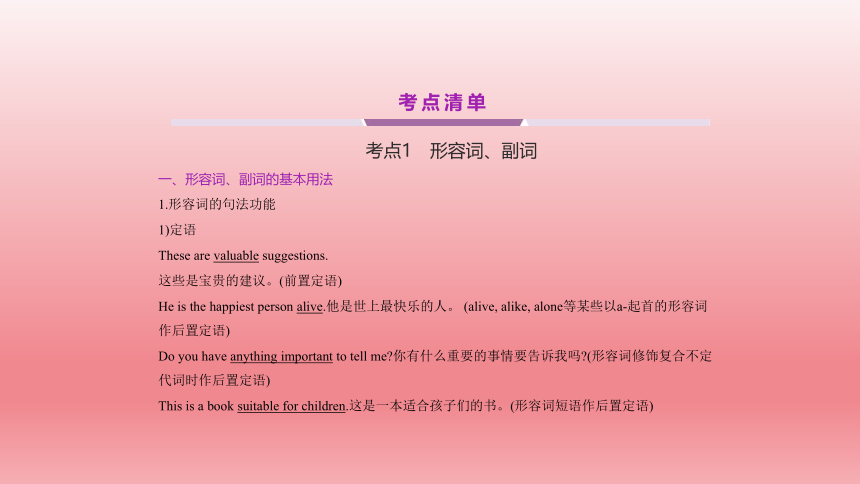
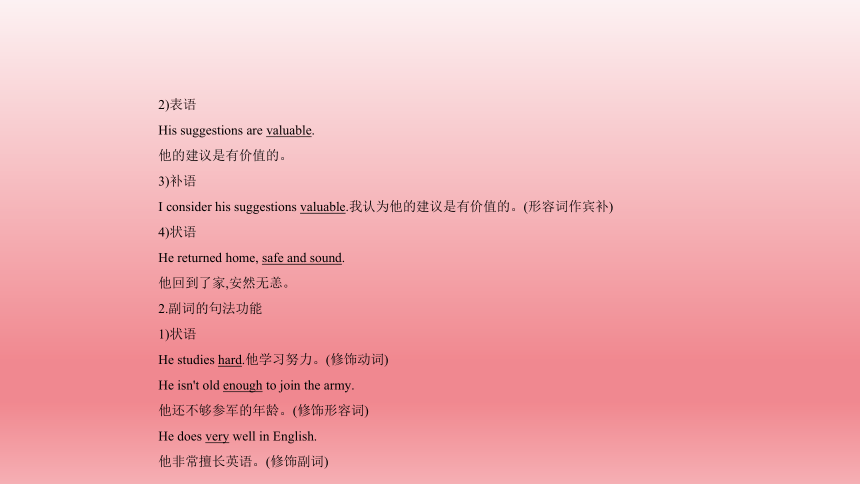
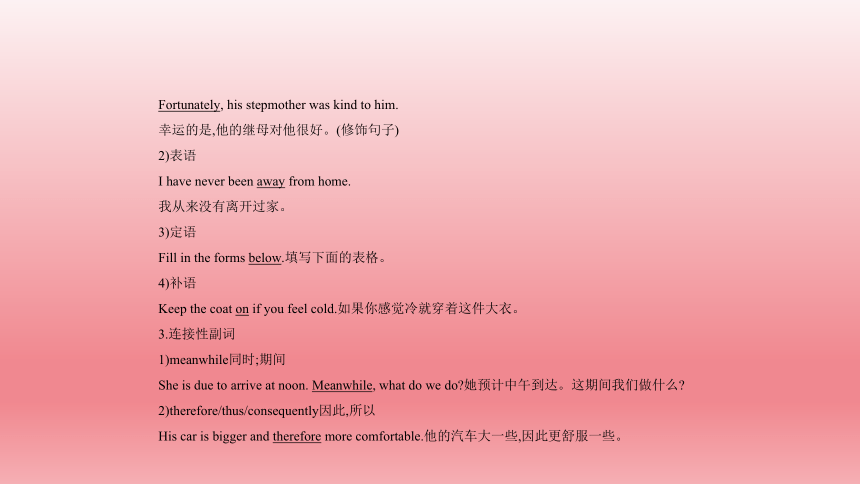
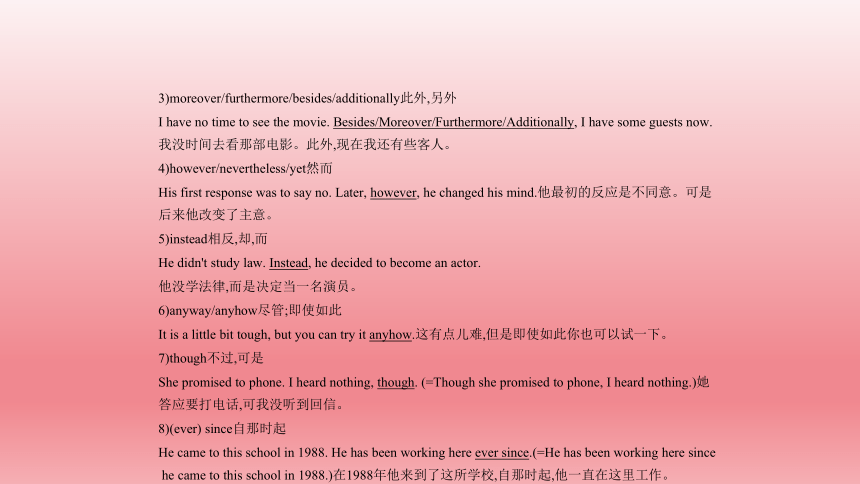
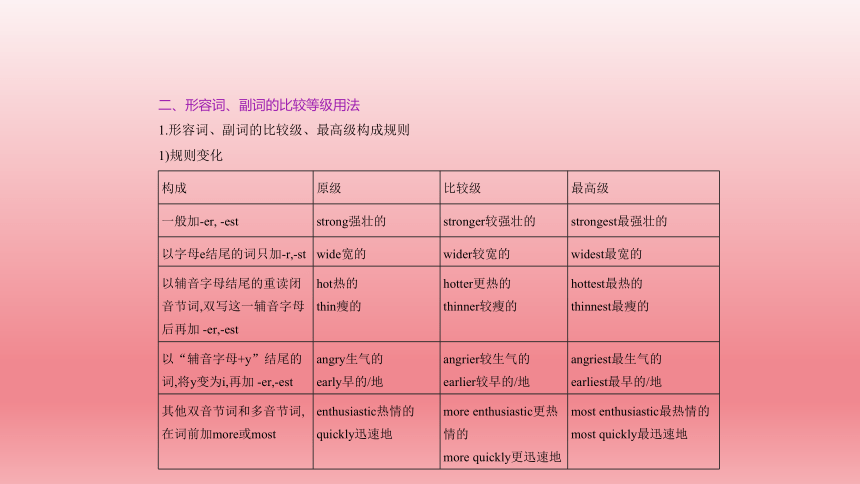
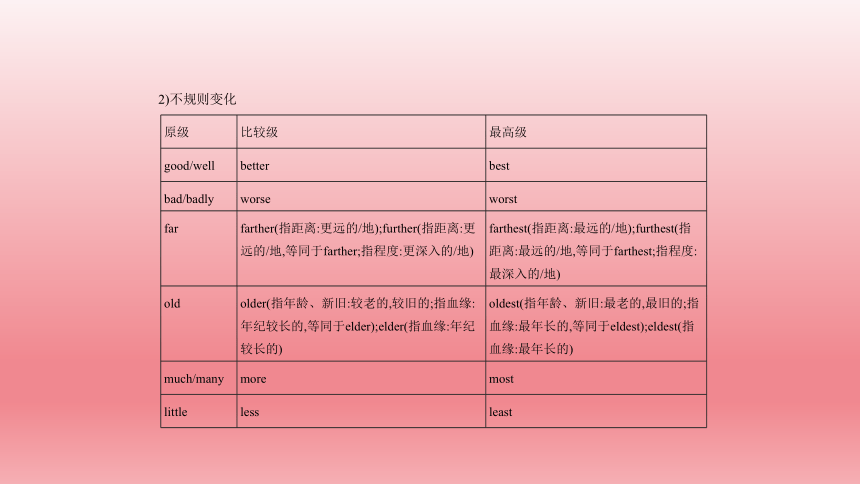
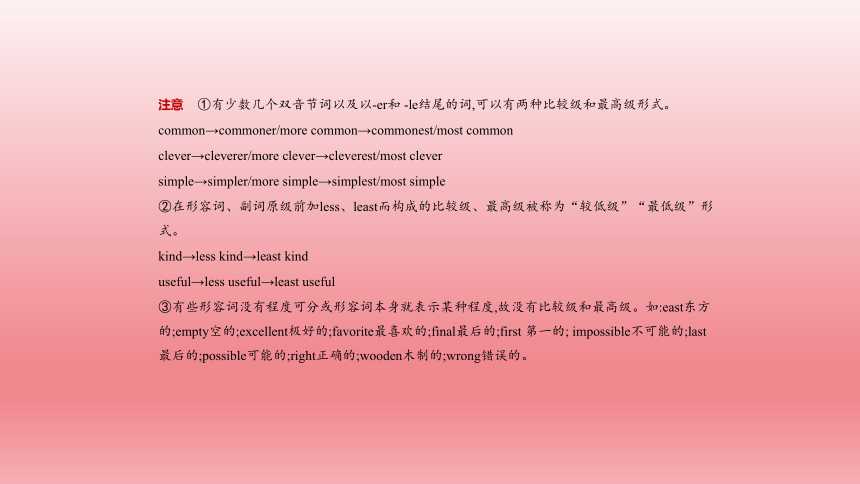
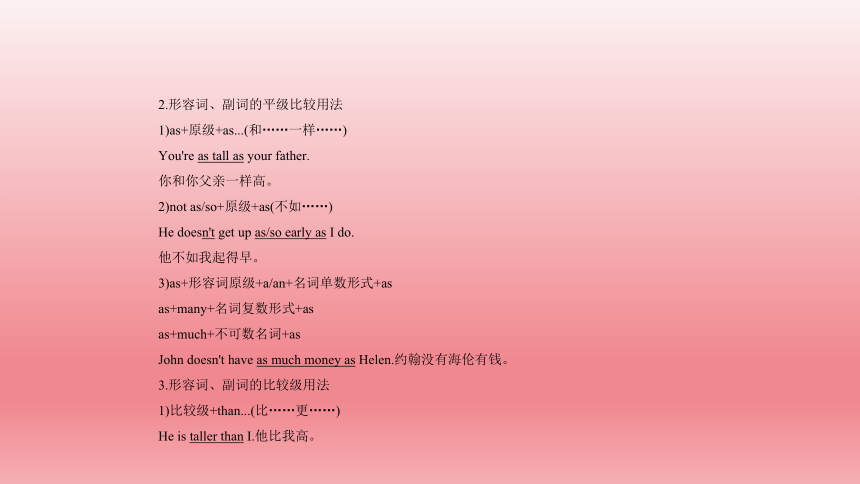
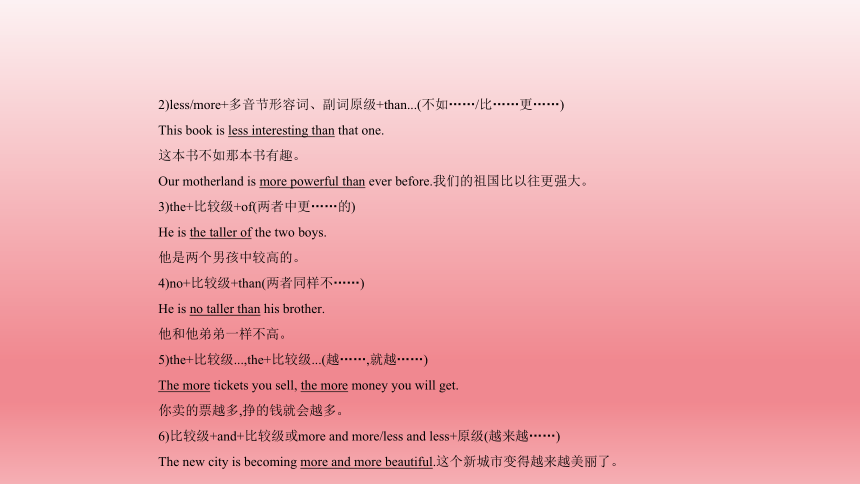
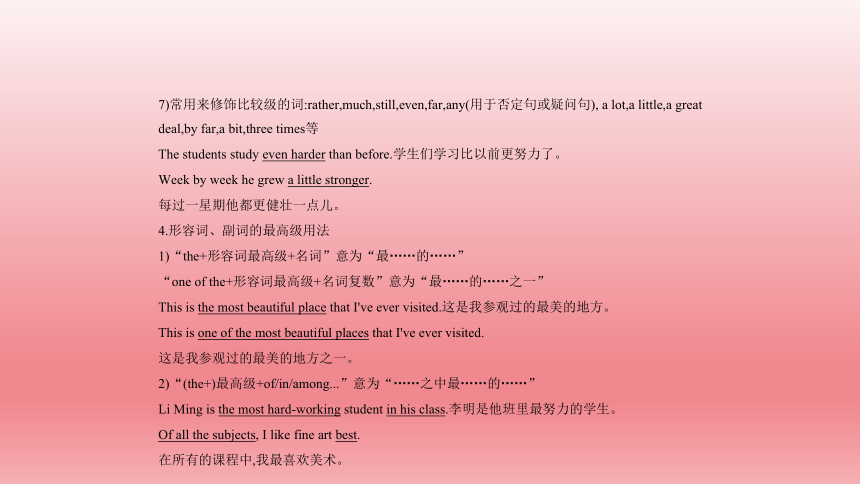
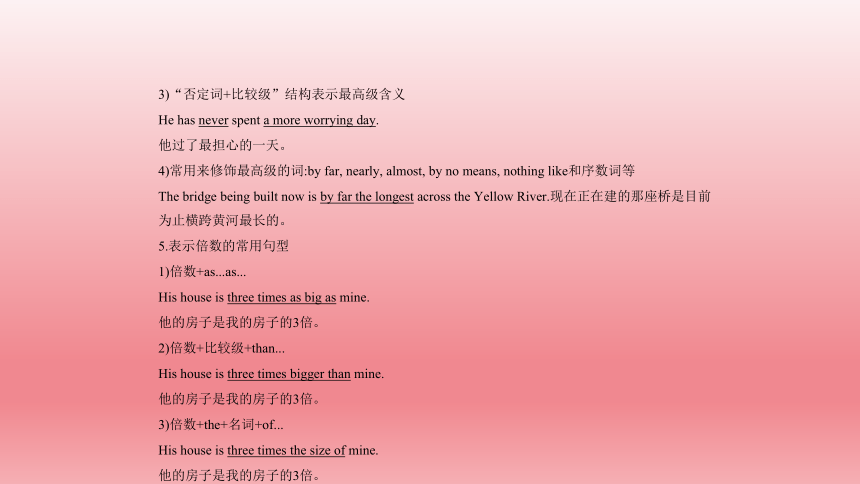
文档简介
(共35张PPT)
2024届高考英语复习专题★★ 形容词、副词和数词
2024届高考英语复习专题★★
考点1 形容词、副词
一、形容词、副词的基本用法
1.形容词的句法功能
1)定语
These are valuable suggestions.
这些是宝贵的建议。(前置定语)
He is the happiest person alive.他是世上最快乐的人。 (alive, alike, alone等某些以a-起首的形容词
作后置定语)
Do you have anything important to tell me 你有什么重要的事情要告诉我吗 (形容词修饰复合不定
代词时作后置定语)
This is a book suitable for children.这是一本适合孩子们的书。(形容词短语作后置定语)
考点清单
2)表语
His suggestions are valuable.
他的建议是有价值的。
3)补语
I consider his suggestions valuable.我认为他的建议是有价值的。(形容词作宾补)
4)状语
He returned home, safe and sound.
他回到了家,安然无恙。
2.副词的句法功能
1)状语
He studies hard.他学习努力。(修饰动词)
He isn't old enough to join the army.
他还不够参军的年龄。(修饰形容词)
He does very well in English.
他非常擅长英语。(修饰副词)
Fortunately, his stepmother was kind to him.
幸运的是,他的继母对他很好。(修饰句子)
2)表语
I have never been away from home.
我从来没有离开过家。
3)定语
Fill in the forms below.填写下面的表格。
4)补语
Keep the coat on if you feel cold.如果你感觉冷就穿着这件大衣。
3.连接性副词
1)meanwhile同时;期间
She is due to arrive at noon. Meanwhile, what do we do 她预计中午到达。这期间我们做什么
2)therefore/thus/consequently因此,所以
His car is bigger and therefore more comfortable.他的汽车大一些,因此更舒服一些。
3)moreover/furthermore/besides/additionally此外,另外
I have no time to see the movie. Besides/Moreover/Furthermore/Additionally, I have some guests now.
我没时间去看那部电影。此外,现在我还有些客人。
4)however/nevertheless/yet然而
His first response was to say no. Later, however, he changed his mind.他最初的反应是不同意。可是
后来他改变了主意。
5)instead相反,却,而
He didn't study law. Instead, he decided to become an actor.
他没学法律,而是决定当一名演员。
6)anyway/anyhow尽管;即使如此
It is a little bit tough, but you can try it anyhow.这有点儿难,但是即使如此你也可以试一下。
7)though不过,可是
She promised to phone. I heard nothing, though. (=Though she promised to phone, I heard nothing.)她
答应要打电话,可我没听到回信。
8)(ever) since自那时起
He came to this school in 1988. He has been working here ever since.(=He has been working here since
he came to this school in 1988.)在1988年他来到了这所学校,自那时起,他一直在这里工作。
二、形容词、副词的比较等级用法
1.形容词、副词的比较级、最高级构成规则
1)规则变化
构成 原级 比较级 最高级
一般加-er, -est strong强壮的 stronger较强壮的 strongest最强壮的
以字母e结尾的词只加-r,-st wide宽的 wider较宽的 widest最宽的
以辅音字母结尾的重读闭音节词,双写这一辅音字母后再加 -er,-est hot热的 thin瘦的 hotter更热的 thinner较瘦的 hottest最热的
thinnest最瘦的
以“辅音字母+y”结尾的词,将y变为i,再加 -er,-est angry生气的 early早的/地 angrier较生气的 earlier较早的/地 angriest最生气的
earliest最早的/地
其他双音节词和多音节词,在词前加more或most enthusiastic热情的 quickly迅速地 more enthusiastic更热
情的 more quickly更迅速地 most enthusiastic最热情的
most quickly最迅速地
2)不规则变化
原级 比较级 最高级
good/well better best
bad/badly worse worst
far farther(指距离:更远的/地);further(指距离:更远的/地,等同于farther;指程度:更深入的/地) farthest(指距离:最远的/地);furthest(指距离:最远的/地,等同于farthest;指程度:最深入的/地)
old older(指年龄、新旧:较老的,较旧的;指血缘:年纪较长的,等同于elder);elder(指血缘:年纪较长的) oldest(指年龄、新旧:最老的,最旧的;指血缘:最年长的,等同于eldest);eldest(指血缘:最年长的)
much/many more most
little less least
注意 ①有少数几个双音节词以及以-er和 -le结尾的词,可以有两种比较级和最高级形式。
common→commoner/more common→commonest/most common
clever→cleverer/more clever→cleverest/most clever
simple→simpler/more simple→simplest/most simple
②在形容词、副词原级前加less、least而构成的比较级、最高级被称为“较低级”“最低级”形
式。
kind→less kind→least kind
useful→less useful→least useful
③有些形容词没有程度可分或形容词本身就表示某种程度,故没有比较级和最高级。如:east东方
的;empty空的;excellent极好的;favorite最喜欢的;final最后的;first 第一的; impossible不可能的;last
最后的;possible可能的;right正确的;wooden木制的;wrong错误的。
2.形容词、副词的平级比较用法
1)as+原级+as...(和……一样……)
You're as tall as your father.
你和你父亲一样高。
2)not as/so+原级+as(不如……)
He doesn't get up as/so early as I do.
他不如我起得早。
3)as+形容词原级+a/an+名词单数形式+as
as+many+名词复数形式+as
as+much+不可数名词+as
John doesn't have as much money as Helen.约翰没有海伦有钱。
3.形容词、副词的比较级用法
1)比较级+than...(比……更……)
He is taller than I.他比我高。
2)less/more+多音节形容词、副词原级+than...(不如……/比……更……)
This book is less interesting than that one.
这本书不如那本书有趣。
Our motherland is more powerful than ever before.我们的祖国比以往更强大。
3)the+比较级+of(两者中更……的)
He is the taller of the two boys.
他是两个男孩中较高的。
4)no+比较级+than(两者同样不……)
He is no taller than his brother.
他和他弟弟一样不高。
5)the+比较级...,the+比较级...(越……,就越……)
The more tickets you sell, the more money you will get.
你卖的票越多,挣的钱就会越多。
6)比较级+and+比较级或more and more/less and less+原级(越来越……)
The new city is becoming more and more beautiful.这个新城市变得越来越美丽了。
7)常用来修饰比较级的词:rather,much,still,even,far,any(用于否定句或疑问句), a lot,a little,a great
deal,by far,a bit,three times等
The students study even harder than before.学生们学习比以前更努力了。
Week by week he grew a little stronger.
每过一星期他都更健壮一点儿。
4.形容词、副词的最高级用法
1)“the+形容词最高级+名词”意为“最……的……”
“one of the+形容词最高级+名词复数”意为“最……的……之一”
This is the most beautiful place that I've ever visited.这是我参观过的最美的地方。
This is one of the most beautiful places that I've ever visited.
这是我参观过的最美的地方之一。
2)“(the+)最高级+of/in/among...”意为“……之中最……的……”
Li Ming is the most hard-working student in his class.李明是他班里最努力的学生。
Of all the subjects, I like fine art best.
在所有的课程中,我最喜欢美术。
3)“否定词+比较级”结构表示最高级含义
He has never spent a more worrying day.
他过了最担心的一天。
4)常用来修饰最高级的词:by far, nearly, almost, by no means, nothing like和序数词等
The bridge being built now is by far the longest across the Yellow River.现在正在建的那座桥是目前
为止横跨黄河最长的。
5.表示倍数的常用句型
1)倍数+as...as...
His house is three times as big as mine.
他的房子是我的房子的3倍。
2)倍数+比较级+than...
His house is three times bigger than mine.
他的房子是我的房子的3倍。
3)倍数+the+名词+of...
His house is three times the size of mine.
他的房子是我的房子的3倍。
4)倍数+what 从句
The output of this year is three times what it was in 2019.
今年的产量是2019年产量的3倍。
5)倍数+that/those of...
The output of this year is three times that of 2019.今年的产量是2019年产量的3倍。
三、形容词、副词的构词法
1.构成形容词的后缀
1)名词+al/ual
act—actual实际的
agriculture—agricultural农业的
culture—cultural文化的
industry—industrial工业的
music—musical音乐的
nature—natural自然的
nation—national国家的
practice—practical实际的
tradition—traditional传统的
2)名词+ic
atom—atomic原子的
base—basic基础的
electron—electronic电子的
energy—energetic精力充沛的
science—scientific科学的
3)名词+ish
child—childish幼稚的
fool—foolish愚蠢的
woman—womanish女人气的
4)名词+ful
beauty—beautiful美丽的
care—careful仔细的
color—colorful丰富多彩的
hope—hopeful充满希望的
harm—harmful有害的
power—powerful强大的
tear—tearful含泪的
use—useful有用的
wonder—wonderful精彩的
5)名词/动词+ant/ent
convenience—convenient方便的
difference—different 不同的
distance—distant遥远的
insist—insistent坚持的
please—pleasant令人高兴的
6)名词+less
care—careless粗心的
end—endless无止境的
home—homeless无家可归的
hope—hopeless无望的
use—useless无用的
value—valueless没有价值的
7)名词+ary
element—elementary基本的;初级的
revolution—revolutionary革命的
8)名词+en
gold—golden金色的
wood—wooden木制的
wool—woolen羊毛的
9)名词+y
cloud—cloudy多云的
health—healthy健康的
luck—lucky幸运的
noise—noisy嘈杂的
sun—sunny晴朗的
shine—shiny有光泽的
sleep—sleepy困的
wealth—wealthy富有的
wind—windy有风的
10)名词+ous
danger—dangerous危险的
envy—envious羡慕的
fame—famous著名的
humor—humorous幽默的
nerve—nervous紧张的
poison—poisonous有毒的
11)动词+ive
act—active积极的
compare—comparative比较的
effect—effective有效的
impress—impressive令人印象深刻的
relate—relative相对的
talk—talkative健谈的
12)动词+ed
excite—excited兴奋的
learn—learned有学问的
surprise—surprised感到惊讶的
13)动词+ing
appeal—appealing有吸引力的
move—moving动人的
challenge—challenging有挑战性的
14)名词/动词+able/ible
accept—acceptable可接受的
adjust—adjustable可调节的
comfort—comfortable舒适的
count—countable可数的
enjoy—enjoyable令人愉快的
horror—horrible可怕的
reason—reasonable合理的
terror—terrible可怕的
value—valuable宝贵的
15)名词/动词+some
awe—awesome令人惊叹的
tire—tiresome烦人的;讨厌的
trouble—troublesome烦人的;讨厌的
2.表示否定意义的前缀
1)im-,in-
active—inactive不活跃的
capable—incapable无能力的
formal—informal非正式的
convenient—inconvenient不方便的
dependent—independent独立的
expensive—inexpensive不昂贵的
patient—impatient不耐烦的
perfect—imperfect不完美的
possible—impossible不可能的
significant—insignificant不重要的
2)il-,ir-
legal—illegal不合法的
regular—irregular不规则的
responsible—irresponsible不负责任的
3)un-
certain—uncertain不确定的
easy—uneasy不安的
fair—unfair不公平的
important—unimportant不重要的
known—unknown未知的;不出名的
necessary—unnecessary不必要的
pleasant—unpleasant不愉快的
reasonable—unreasonable不合理的
successful—unsuccessful不成功的
tidy—untidy不整洁的
usual—unusual不寻常的
4)non-
alcoholic—non-alcoholic不含酒精的
profit-making—non-profit-making非营利的
5)dis-
honest—dishonest不诚实的
satisfied—dissatisfied不满意的
3.形容词变副词的规则
情况 构成 例词 例外
一般情况 加-ly quick—quickly brave—bravely
辅音字母+-y结尾 将y改为i后再加-ly easy—easily happy—happily heavy—heavily busy—busily shy—shyly
dry—dryly
-le结尾 去e加-y simple—simply gentle—gently whole—wholly
元音字母+-e结尾 去e加-ly true—truly
-ll结尾 只加-y full—fully dull—dully
-ic结尾 加-ally basic—basically scientific— scientifically
注意 以-ly结尾的形容词:
daily每日的;deadly致命的;friendly友好的;lovely可爱的;lively生动的;lonely孤独的;monthly每月的;weekly每周的
四、易混形容词、副词辨析
1.ago, before
1)ago表示从现在算起若干时间以前,常与一般过去时连用。
I graduated from the college 10 years ago.
十年前我毕业于这所大学。
2)before表示从过去某一时间算起若干时间以前,常与过去完成时连用。
She said that she had married him 5 months before.她说五个月前她嫁给了他。
2.hardly, hard
1)hardly adv.几乎不
2)hard adj.艰难的 adv.努力地
This is a hard job. We can hardly believe Peter works so hard.这是一项艰难的工作。我们几乎不相
信彼得会如此卖力地工作。
3.so, such
1)so+形容词/副词
so+形容词+a/an+单数可数名词
so+many/few+复数名词
so+much/little(少)+不可数名词
He spoke so fast that we couldn't understand him.他讲话如此快以至于我们都听不懂他的话。
She is so diligent a student.
她是一个如此勤奋的学生。
There are so many books in the library.
那家图书馆里有如此多的书。
Don't make so much noise!
不要制造如此多的噪声!
2)such+形容词+复数名词或不可数名词
such+a/an+形容词+单数可数名词
They are such interesting books that we all like them.
这些书如此有趣以至于我们都喜欢它们。
She is such a clever student.
她是一个如此聪明的学生。
4.late, later, latter, latest, lately
1)late adj.接近末期的;迟到的 adv.迟,晚
2)later adj.后来的,以后的 adv.后来,以后
3)latter adj.(两者中)后者的
4)latest adj.最新的,最近的
5)lately adv.最近,近来
The birthday card arrived three days late.
生日贺卡晚到了三天。
I met her again three years later.
三年后我又遇见她了。
The latter point is the most important.
后面提及的那一点是最重要的。
Have you heard the latest news 你听到最新消息了吗
It's only lately that she's been well enough to go out.
她只是最近才康复到可以出去走一走了。
5.as well, also, too, either
1)as well意为 “也”,放在肯定句的句末。
If he winks at you, you may wink back as well.如果他向你使眼色,你也可以使眼色以示回应。
2)also意为 “也”,放在肯定句的句中,大多放在be动词、助动词、情态动词之后,或实义动词之
前。
My girlfriend is also called Helen.
我的女朋友也叫海伦。
3)too意为 “也”,放在肯定句的句中、句末。
They will, too, graduate from the university next year.
明年他们也将从这个大学毕业。
4)either意为 “也”,放在否定句的句末。
Mary won't go and Peter won't go either.
玛丽不会去,彼得也不会去。
6.somewhere, anywhere, everywhere, nowhere
1)somewhere在某处,到某处
My wallet must be around here somewhere.
我的钱包肯定是在这里的什么地方。
2)anywhere在任何地方,去任何地方
If you go anywhere, take me with you.
你要是去什么地方,带我一起去。
3)everywhere各个地方;到处;处处
I've looked everywhere but I can't find the map.
我到处都找过了,但就是找不到地图。
4)nowhere 任何地方都不;无处
There was nowhere for me to sit.
我无处可坐。
7.many, much
1)many修饰名词的复数形式,意为“许多的”。
There are many different kinds of flowers and trees in the park.公园里有许多不同种类的花和树木。
2)much修饰不可数名词,意为“许多的”;修饰比较级;表示程度。
I don't have much money on me.我身上带的钱不多。
Compared with the past, we are much happier.与过去相比,我们更幸福。
We miss you as much as you miss us.
我们想念你如同你想念我们一样。
8.too, very, so
1)too太……(在意义上达到过分的程度)
That is too much; he won't accept it.
那太过分了,他不会接受的。
2)very非常;很(广泛使用且比较口语化)
Thank you very much indeed.真的很感谢您。
3)so如此,那么(在意义上达到很明显的程度)
Don't look so angry.别那样怒气冲冲。
9.possible, probable, likely
1)词义方面
①possible指客观上的可能性,但往往含有希望很小的意思;
②probable比possible表示的可能性大,意为“很可能发生的”,指有实际依据或逻辑上合情合理的
事情;
③likely是从外表迹象进行判断有可能发生某事。
2)句型方面
①It be possible/probable/likely+that从句;
②It be possible(for sb.)to do sth.;
③sb./sth. be likely to do sth.。
It is possible,though not probable, that he will come tomorrow.
他明天可能来,但可能性不大。
The probable cause of his failure was that he was too tired.
他失败的原因很可能是他太累了。
He is very likely to ring me tonight.今晚他很可能给我打电话。
考点2 数词
一、基数词、序数词的基本构成
1~10 11~19 20~90中整几十的数词 ≥100 基数词 序数词 基数词 序数词 基数词 序数词 基数词 序数词
one first eleven eleventh 1 hundred 1 hundredth
two second twelve twelfth twenty twentieth 1 thousand 1 thousandth
three third thirteen thirteenth thirty thirtieth 1 million 1 millionth
four fourth fourteen fourteenth forty fortieth 1 billion 1 billionth
five fifth fifteen fifteenth fifty fiftieth 1 trillion 1 trillionth
six sixth sixteen sixteenth sixty sixtieth
seven seventh seventeen seven-
teenth seventy seventieth
eight eighth eighteen eighteenth eighty eightieth
nine ninth nineteen nineteenth ninety ninetieth
ten tenth
注意 1.基数词
①1~12单独记;
②13~19词尾为后缀-teen;
③20~90整十词尾为后缀-ty;
④21~99(除整十词外)在十位数和个位数之间加连字符(如:twenty-one);
⑤101~999先说几百,再加and,再加末尾两位数(或末位数)(如:268 two hundred and sixty-eight);
⑥dozen, score, hundred, thousand, million, billion, trillion前面加具体数字时,这些词仍用单数形式
(如:one hundred, two thousand, three million); “dozen, score, hundred, thousand,
million, billion, trillion的复数形式+of”表示不确切的数量,意为:许多、几百、几千等,如:
hundreds of books几百本书。
2.序数词
①第1至第19,除第1(first)、第2(second)、第3(third)外,其余均在基数词的后面加-th。在这些
序数词中fifth, eighth, ninth, twelfth的拼写较特殊;
②第20至第90中整几十的序数词是将基数词词尾的y变成ie,再加-th构成;
③hundred, thousand, million, billion, trillion的序数词均在其后加-th,即hundredth, thousandth, millionth, billionth, trillionth。
二、数词的句法功能
基数词和序数词的句法功能基本上相当于名词和形容词的句法功能,它们在句中可作主语、表
语、宾语、定语和同位语。
成分 例句
主语 Two were late yesterday.昨天有两个迟到了。
The second is bigger than the first.第二个比第一个大。
表语 I'm eighteen.我18岁。
He was the first to arrive here.他是第一个到这里的。
宾语 Give me four.给我4个。
I like the fourth.我喜欢第4个。
定语 We have six subjects this term.这个学期我们有6门课。
The sixth blind man went forward to feel the elephant.第6个盲人走上前去摸大象。
同位语 We two have been to Beijing.
我们俩去过北京。
I want the big one, the first on the right.我想要那个大的,右边第一个。
2024届高考英语复习专题★★ 形容词、副词和数词
2024届高考英语复习专题★★
考点1 形容词、副词
一、形容词、副词的基本用法
1.形容词的句法功能
1)定语
These are valuable suggestions.
这些是宝贵的建议。(前置定语)
He is the happiest person alive.他是世上最快乐的人。 (alive, alike, alone等某些以a-起首的形容词
作后置定语)
Do you have anything important to tell me 你有什么重要的事情要告诉我吗 (形容词修饰复合不定
代词时作后置定语)
This is a book suitable for children.这是一本适合孩子们的书。(形容词短语作后置定语)
考点清单
2)表语
His suggestions are valuable.
他的建议是有价值的。
3)补语
I consider his suggestions valuable.我认为他的建议是有价值的。(形容词作宾补)
4)状语
He returned home, safe and sound.
他回到了家,安然无恙。
2.副词的句法功能
1)状语
He studies hard.他学习努力。(修饰动词)
He isn't old enough to join the army.
他还不够参军的年龄。(修饰形容词)
He does very well in English.
他非常擅长英语。(修饰副词)
Fortunately, his stepmother was kind to him.
幸运的是,他的继母对他很好。(修饰句子)
2)表语
I have never been away from home.
我从来没有离开过家。
3)定语
Fill in the forms below.填写下面的表格。
4)补语
Keep the coat on if you feel cold.如果你感觉冷就穿着这件大衣。
3.连接性副词
1)meanwhile同时;期间
She is due to arrive at noon. Meanwhile, what do we do 她预计中午到达。这期间我们做什么
2)therefore/thus/consequently因此,所以
His car is bigger and therefore more comfortable.他的汽车大一些,因此更舒服一些。
3)moreover/furthermore/besides/additionally此外,另外
I have no time to see the movie. Besides/Moreover/Furthermore/Additionally, I have some guests now.
我没时间去看那部电影。此外,现在我还有些客人。
4)however/nevertheless/yet然而
His first response was to say no. Later, however, he changed his mind.他最初的反应是不同意。可是
后来他改变了主意。
5)instead相反,却,而
He didn't study law. Instead, he decided to become an actor.
他没学法律,而是决定当一名演员。
6)anyway/anyhow尽管;即使如此
It is a little bit tough, but you can try it anyhow.这有点儿难,但是即使如此你也可以试一下。
7)though不过,可是
She promised to phone. I heard nothing, though. (=Though she promised to phone, I heard nothing.)她
答应要打电话,可我没听到回信。
8)(ever) since自那时起
He came to this school in 1988. He has been working here ever since.(=He has been working here since
he came to this school in 1988.)在1988年他来到了这所学校,自那时起,他一直在这里工作。
二、形容词、副词的比较等级用法
1.形容词、副词的比较级、最高级构成规则
1)规则变化
构成 原级 比较级 最高级
一般加-er, -est strong强壮的 stronger较强壮的 strongest最强壮的
以字母e结尾的词只加-r,-st wide宽的 wider较宽的 widest最宽的
以辅音字母结尾的重读闭音节词,双写这一辅音字母后再加 -er,-est hot热的 thin瘦的 hotter更热的 thinner较瘦的 hottest最热的
thinnest最瘦的
以“辅音字母+y”结尾的词,将y变为i,再加 -er,-est angry生气的 early早的/地 angrier较生气的 earlier较早的/地 angriest最生气的
earliest最早的/地
其他双音节词和多音节词,在词前加more或most enthusiastic热情的 quickly迅速地 more enthusiastic更热
情的 more quickly更迅速地 most enthusiastic最热情的
most quickly最迅速地
2)不规则变化
原级 比较级 最高级
good/well better best
bad/badly worse worst
far farther(指距离:更远的/地);further(指距离:更远的/地,等同于farther;指程度:更深入的/地) farthest(指距离:最远的/地);furthest(指距离:最远的/地,等同于farthest;指程度:最深入的/地)
old older(指年龄、新旧:较老的,较旧的;指血缘:年纪较长的,等同于elder);elder(指血缘:年纪较长的) oldest(指年龄、新旧:最老的,最旧的;指血缘:最年长的,等同于eldest);eldest(指血缘:最年长的)
much/many more most
little less least
注意 ①有少数几个双音节词以及以-er和 -le结尾的词,可以有两种比较级和最高级形式。
common→commoner/more common→commonest/most common
clever→cleverer/more clever→cleverest/most clever
simple→simpler/more simple→simplest/most simple
②在形容词、副词原级前加less、least而构成的比较级、最高级被称为“较低级”“最低级”形
式。
kind→less kind→least kind
useful→less useful→least useful
③有些形容词没有程度可分或形容词本身就表示某种程度,故没有比较级和最高级。如:east东方
的;empty空的;excellent极好的;favorite最喜欢的;final最后的;first 第一的; impossible不可能的;last
最后的;possible可能的;right正确的;wooden木制的;wrong错误的。
2.形容词、副词的平级比较用法
1)as+原级+as...(和……一样……)
You're as tall as your father.
你和你父亲一样高。
2)not as/so+原级+as(不如……)
He doesn't get up as/so early as I do.
他不如我起得早。
3)as+形容词原级+a/an+名词单数形式+as
as+many+名词复数形式+as
as+much+不可数名词+as
John doesn't have as much money as Helen.约翰没有海伦有钱。
3.形容词、副词的比较级用法
1)比较级+than...(比……更……)
He is taller than I.他比我高。
2)less/more+多音节形容词、副词原级+than...(不如……/比……更……)
This book is less interesting than that one.
这本书不如那本书有趣。
Our motherland is more powerful than ever before.我们的祖国比以往更强大。
3)the+比较级+of(两者中更……的)
He is the taller of the two boys.
他是两个男孩中较高的。
4)no+比较级+than(两者同样不……)
He is no taller than his brother.
他和他弟弟一样不高。
5)the+比较级...,the+比较级...(越……,就越……)
The more tickets you sell, the more money you will get.
你卖的票越多,挣的钱就会越多。
6)比较级+and+比较级或more and more/less and less+原级(越来越……)
The new city is becoming more and more beautiful.这个新城市变得越来越美丽了。
7)常用来修饰比较级的词:rather,much,still,even,far,any(用于否定句或疑问句), a lot,a little,a great
deal,by far,a bit,three times等
The students study even harder than before.学生们学习比以前更努力了。
Week by week he grew a little stronger.
每过一星期他都更健壮一点儿。
4.形容词、副词的最高级用法
1)“the+形容词最高级+名词”意为“最……的……”
“one of the+形容词最高级+名词复数”意为“最……的……之一”
This is the most beautiful place that I've ever visited.这是我参观过的最美的地方。
This is one of the most beautiful places that I've ever visited.
这是我参观过的最美的地方之一。
2)“(the+)最高级+of/in/among...”意为“……之中最……的……”
Li Ming is the most hard-working student in his class.李明是他班里最努力的学生。
Of all the subjects, I like fine art best.
在所有的课程中,我最喜欢美术。
3)“否定词+比较级”结构表示最高级含义
He has never spent a more worrying day.
他过了最担心的一天。
4)常用来修饰最高级的词:by far, nearly, almost, by no means, nothing like和序数词等
The bridge being built now is by far the longest across the Yellow River.现在正在建的那座桥是目前
为止横跨黄河最长的。
5.表示倍数的常用句型
1)倍数+as...as...
His house is three times as big as mine.
他的房子是我的房子的3倍。
2)倍数+比较级+than...
His house is three times bigger than mine.
他的房子是我的房子的3倍。
3)倍数+the+名词+of...
His house is three times the size of mine.
他的房子是我的房子的3倍。
4)倍数+what 从句
The output of this year is three times what it was in 2019.
今年的产量是2019年产量的3倍。
5)倍数+that/those of...
The output of this year is three times that of 2019.今年的产量是2019年产量的3倍。
三、形容词、副词的构词法
1.构成形容词的后缀
1)名词+al/ual
act—actual实际的
agriculture—agricultural农业的
culture—cultural文化的
industry—industrial工业的
music—musical音乐的
nature—natural自然的
nation—national国家的
practice—practical实际的
tradition—traditional传统的
2)名词+ic
atom—atomic原子的
base—basic基础的
electron—electronic电子的
energy—energetic精力充沛的
science—scientific科学的
3)名词+ish
child—childish幼稚的
fool—foolish愚蠢的
woman—womanish女人气的
4)名词+ful
beauty—beautiful美丽的
care—careful仔细的
color—colorful丰富多彩的
hope—hopeful充满希望的
harm—harmful有害的
power—powerful强大的
tear—tearful含泪的
use—useful有用的
wonder—wonderful精彩的
5)名词/动词+ant/ent
convenience—convenient方便的
difference—different 不同的
distance—distant遥远的
insist—insistent坚持的
please—pleasant令人高兴的
6)名词+less
care—careless粗心的
end—endless无止境的
home—homeless无家可归的
hope—hopeless无望的
use—useless无用的
value—valueless没有价值的
7)名词+ary
element—elementary基本的;初级的
revolution—revolutionary革命的
8)名词+en
gold—golden金色的
wood—wooden木制的
wool—woolen羊毛的
9)名词+y
cloud—cloudy多云的
health—healthy健康的
luck—lucky幸运的
noise—noisy嘈杂的
sun—sunny晴朗的
shine—shiny有光泽的
sleep—sleepy困的
wealth—wealthy富有的
wind—windy有风的
10)名词+ous
danger—dangerous危险的
envy—envious羡慕的
fame—famous著名的
humor—humorous幽默的
nerve—nervous紧张的
poison—poisonous有毒的
11)动词+ive
act—active积极的
compare—comparative比较的
effect—effective有效的
impress—impressive令人印象深刻的
relate—relative相对的
talk—talkative健谈的
12)动词+ed
excite—excited兴奋的
learn—learned有学问的
surprise—surprised感到惊讶的
13)动词+ing
appeal—appealing有吸引力的
move—moving动人的
challenge—challenging有挑战性的
14)名词/动词+able/ible
accept—acceptable可接受的
adjust—adjustable可调节的
comfort—comfortable舒适的
count—countable可数的
enjoy—enjoyable令人愉快的
horror—horrible可怕的
reason—reasonable合理的
terror—terrible可怕的
value—valuable宝贵的
15)名词/动词+some
awe—awesome令人惊叹的
tire—tiresome烦人的;讨厌的
trouble—troublesome烦人的;讨厌的
2.表示否定意义的前缀
1)im-,in-
active—inactive不活跃的
capable—incapable无能力的
formal—informal非正式的
convenient—inconvenient不方便的
dependent—independent独立的
expensive—inexpensive不昂贵的
patient—impatient不耐烦的
perfect—imperfect不完美的
possible—impossible不可能的
significant—insignificant不重要的
2)il-,ir-
legal—illegal不合法的
regular—irregular不规则的
responsible—irresponsible不负责任的
3)un-
certain—uncertain不确定的
easy—uneasy不安的
fair—unfair不公平的
important—unimportant不重要的
known—unknown未知的;不出名的
necessary—unnecessary不必要的
pleasant—unpleasant不愉快的
reasonable—unreasonable不合理的
successful—unsuccessful不成功的
tidy—untidy不整洁的
usual—unusual不寻常的
4)non-
alcoholic—non-alcoholic不含酒精的
profit-making—non-profit-making非营利的
5)dis-
honest—dishonest不诚实的
satisfied—dissatisfied不满意的
3.形容词变副词的规则
情况 构成 例词 例外
一般情况 加-ly quick—quickly brave—bravely
辅音字母+-y结尾 将y改为i后再加-ly easy—easily happy—happily heavy—heavily busy—busily shy—shyly
dry—dryly
-le结尾 去e加-y simple—simply gentle—gently whole—wholly
元音字母+-e结尾 去e加-ly true—truly
-ll结尾 只加-y full—fully dull—dully
-ic结尾 加-ally basic—basically scientific— scientifically
注意 以-ly结尾的形容词:
daily每日的;deadly致命的;friendly友好的;lovely可爱的;lively生动的;lonely孤独的;monthly每月的;weekly每周的
四、易混形容词、副词辨析
1.ago, before
1)ago表示从现在算起若干时间以前,常与一般过去时连用。
I graduated from the college 10 years ago.
十年前我毕业于这所大学。
2)before表示从过去某一时间算起若干时间以前,常与过去完成时连用。
She said that she had married him 5 months before.她说五个月前她嫁给了他。
2.hardly, hard
1)hardly adv.几乎不
2)hard adj.艰难的 adv.努力地
This is a hard job. We can hardly believe Peter works so hard.这是一项艰难的工作。我们几乎不相
信彼得会如此卖力地工作。
3.so, such
1)so+形容词/副词
so+形容词+a/an+单数可数名词
so+many/few+复数名词
so+much/little(少)+不可数名词
He spoke so fast that we couldn't understand him.他讲话如此快以至于我们都听不懂他的话。
She is so diligent a student.
她是一个如此勤奋的学生。
There are so many books in the library.
那家图书馆里有如此多的书。
Don't make so much noise!
不要制造如此多的噪声!
2)such+形容词+复数名词或不可数名词
such+a/an+形容词+单数可数名词
They are such interesting books that we all like them.
这些书如此有趣以至于我们都喜欢它们。
She is such a clever student.
她是一个如此聪明的学生。
4.late, later, latter, latest, lately
1)late adj.接近末期的;迟到的 adv.迟,晚
2)later adj.后来的,以后的 adv.后来,以后
3)latter adj.(两者中)后者的
4)latest adj.最新的,最近的
5)lately adv.最近,近来
The birthday card arrived three days late.
生日贺卡晚到了三天。
I met her again three years later.
三年后我又遇见她了。
The latter point is the most important.
后面提及的那一点是最重要的。
Have you heard the latest news 你听到最新消息了吗
It's only lately that she's been well enough to go out.
她只是最近才康复到可以出去走一走了。
5.as well, also, too, either
1)as well意为 “也”,放在肯定句的句末。
If he winks at you, you may wink back as well.如果他向你使眼色,你也可以使眼色以示回应。
2)also意为 “也”,放在肯定句的句中,大多放在be动词、助动词、情态动词之后,或实义动词之
前。
My girlfriend is also called Helen.
我的女朋友也叫海伦。
3)too意为 “也”,放在肯定句的句中、句末。
They will, too, graduate from the university next year.
明年他们也将从这个大学毕业。
4)either意为 “也”,放在否定句的句末。
Mary won't go and Peter won't go either.
玛丽不会去,彼得也不会去。
6.somewhere, anywhere, everywhere, nowhere
1)somewhere在某处,到某处
My wallet must be around here somewhere.
我的钱包肯定是在这里的什么地方。
2)anywhere在任何地方,去任何地方
If you go anywhere, take me with you.
你要是去什么地方,带我一起去。
3)everywhere各个地方;到处;处处
I've looked everywhere but I can't find the map.
我到处都找过了,但就是找不到地图。
4)nowhere 任何地方都不;无处
There was nowhere for me to sit.
我无处可坐。
7.many, much
1)many修饰名词的复数形式,意为“许多的”。
There are many different kinds of flowers and trees in the park.公园里有许多不同种类的花和树木。
2)much修饰不可数名词,意为“许多的”;修饰比较级;表示程度。
I don't have much money on me.我身上带的钱不多。
Compared with the past, we are much happier.与过去相比,我们更幸福。
We miss you as much as you miss us.
我们想念你如同你想念我们一样。
8.too, very, so
1)too太……(在意义上达到过分的程度)
That is too much; he won't accept it.
那太过分了,他不会接受的。
2)very非常;很(广泛使用且比较口语化)
Thank you very much indeed.真的很感谢您。
3)so如此,那么(在意义上达到很明显的程度)
Don't look so angry.别那样怒气冲冲。
9.possible, probable, likely
1)词义方面
①possible指客观上的可能性,但往往含有希望很小的意思;
②probable比possible表示的可能性大,意为“很可能发生的”,指有实际依据或逻辑上合情合理的
事情;
③likely是从外表迹象进行判断有可能发生某事。
2)句型方面
①It be possible/probable/likely+that从句;
②It be possible(for sb.)to do sth.;
③sb./sth. be likely to do sth.。
It is possible,though not probable, that he will come tomorrow.
他明天可能来,但可能性不大。
The probable cause of his failure was that he was too tired.
他失败的原因很可能是他太累了。
He is very likely to ring me tonight.今晚他很可能给我打电话。
考点2 数词
一、基数词、序数词的基本构成
1~10 11~19 20~90中整几十的数词 ≥100 基数词 序数词 基数词 序数词 基数词 序数词 基数词 序数词
one first eleven eleventh 1 hundred 1 hundredth
two second twelve twelfth twenty twentieth 1 thousand 1 thousandth
three third thirteen thirteenth thirty thirtieth 1 million 1 millionth
four fourth fourteen fourteenth forty fortieth 1 billion 1 billionth
five fifth fifteen fifteenth fifty fiftieth 1 trillion 1 trillionth
six sixth sixteen sixteenth sixty sixtieth
seven seventh seventeen seven-
teenth seventy seventieth
eight eighth eighteen eighteenth eighty eightieth
nine ninth nineteen nineteenth ninety ninetieth
ten tenth
注意 1.基数词
①1~12单独记;
②13~19词尾为后缀-teen;
③20~90整十词尾为后缀-ty;
④21~99(除整十词外)在十位数和个位数之间加连字符(如:twenty-one);
⑤101~999先说几百,再加and,再加末尾两位数(或末位数)(如:268 two hundred and sixty-eight);
⑥dozen, score, hundred, thousand, million, billion, trillion前面加具体数字时,这些词仍用单数形式
(如:one hundred, two thousand, three million); “dozen, score, hundred, thousand,
million, billion, trillion的复数形式+of”表示不确切的数量,意为:许多、几百、几千等,如:
hundreds of books几百本书。
2.序数词
①第1至第19,除第1(first)、第2(second)、第3(third)外,其余均在基数词的后面加-th。在这些
序数词中fifth, eighth, ninth, twelfth的拼写较特殊;
②第20至第90中整几十的序数词是将基数词词尾的y变成ie,再加-th构成;
③hundred, thousand, million, billion, trillion的序数词均在其后加-th,即hundredth, thousandth, millionth, billionth, trillionth。
二、数词的句法功能
基数词和序数词的句法功能基本上相当于名词和形容词的句法功能,它们在句中可作主语、表
语、宾语、定语和同位语。
成分 例句
主语 Two were late yesterday.昨天有两个迟到了。
The second is bigger than the first.第二个比第一个大。
表语 I'm eighteen.我18岁。
He was the first to arrive here.他是第一个到这里的。
宾语 Give me four.给我4个。
I like the fourth.我喜欢第4个。
定语 We have six subjects this term.这个学期我们有6门课。
The sixth blind man went forward to feel the elephant.第6个盲人走上前去摸大象。
同位语 We two have been to Beijing.
我们俩去过北京。
I want the big one, the first on the right.我想要那个大的,右边第一个。
